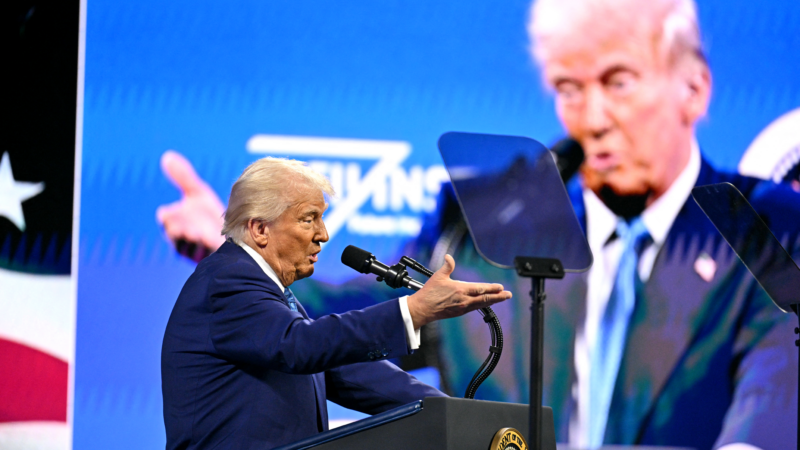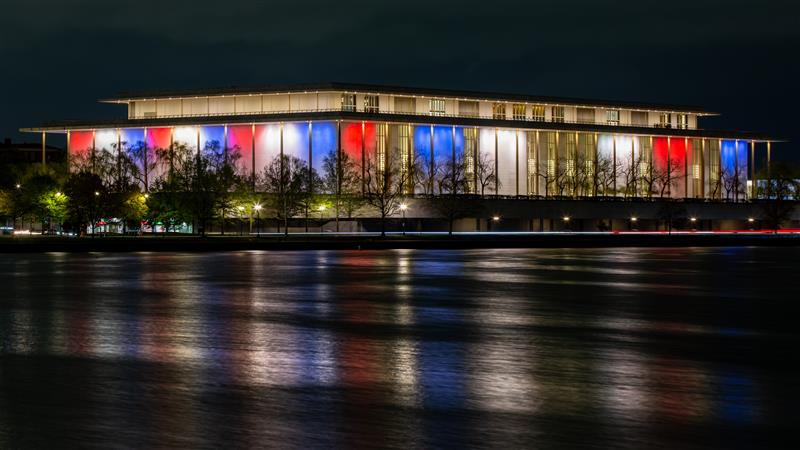Trump wants more power over agencies. Experts worry about campaign finance regulators
President Trump’s executive order Tuesday to “rein in” independent agencies is raising particular concern among those who follow the work of the Federal Election Commission, which is in charge of enforcing the country’s campaign finance laws.
There are currently about 80 agencies across the federal government that were designed by Congress to be independent of the White House, including at least two agencies related to elections. Trump’s executive order announced Tuesday seeks to require these agencies to run all new policies, rulings and regulations by the president.
Adav Noti, a former FEC official who’s now executive director at the nonprofit Campaign Legal Center, said the FEC, in particular, was created by Congress following the Watergate scandal to be both bipartisan and independent, so that it would not be “beholden to any particular president.”
Noti notes how the FEC is unique.
“The FEC, unlike basically every other federal agency, has a role in enforcing the law against the president as a candidate and as a holder of federal office,” Noti told NPR. “And that’s a really unique function for the Federal Election Commission. And so for President Trump to purport to bring the FEC under his direct control seems contrary to all of the ways that Congress has structured the FEC to be independent.”
It’s a view contested by the Trump administration.
In the order, the White House accused the independent agencies of issuing “rules and regulations that cost billions of dollars and implicate some of the most controversial policy matters,” without “the review of the democratically elected President.”
Russell Vought, the current director of the United States Office of Management and Budget, told NPR in 2023 that he thinks civil servants should serve the president’s political agenda.
“The notion of an independent agency – whether that’s a flat-out independent agency like the FCC or an agency that has parts of it that view itself as independent, like the Department of Justice – we’re planting a flag and saying we reject that notion completely,” he said.
Trump targets the FEC — which has been asked to weigh in on Trump
Like many of Trump’s recent executive orders, it’s unclear whether this latest action would be upheld by the courts, should it be challenged.
But already, this is the second time in Trump’s second term that he has purportedly meddled with the independence of the election commission. Earlier this month, a Democratic member of the FEC said Trump attempted to fire her without following proper legal channels.
Daniel Weiner — director of the Elections and Government Program at the Brennan Center for Justice, a group critical of the president’s attacks on the electoral process — said this latest order could amount to another attack on the agency’s mission.
“The idea that the president can just remove the FEC commissioners and have the FEC under his thumb is very dangerous,” he said. “They are asserting just total control over the agency. And to me, that’s a very, very risky path we’re embarking on.”
Noti said in the last eight years the FEC has been called upon “dozens and dozens of times” to weigh in on whether Trump, who tried to overturn the 2020 election, broke the law while running for public office. There are currently numerous complaints before the FEC against Trump’s 2024 campaign, as well as complaints filed by his campaign against the Harris campaign.
“And it is going to be quite difficult if the FEC perceives itself to be answerable to the president, to give an honest assessment of the legality in that situation, and to hold the president accountable for his lawbreaking,” he said. “So there’s a direct conflict there between the FEC as law enforcement role and being answerable to the president, which of course, is why Congress set up the FEC to be independent.”
Frustration with the FEC and “gridlock”
Despite the FEC’s purpose, campaign finance experts have long expressed frustration with the commission’s structural gridlock.
The FEC is supposed to be represented by six commissioners who are appointed by the president and are confirmed by the Senate to serve in staggered six-year terms. No political party is allowed to be represented by more than three of the six seats on the FEC. In order to reach a decision, four commissioners have to agree.
Karen Sebold, assistant professor in political science at the University of Arkansas, said that due to the political nature of these decisions, the commission often deadlocks.
“That’s definitely a big problem,” she said. “But, you know, there’s also another component to this and part of the problem is that they’re not able to make a lot of decisions, or they literally come to a grinding halt and can’t make any decisions, because they don’t have enough commissioners present. And that’s the fault of the president and Congress.”
Currently multiple commissioners are serving expired terms and there are vacant seats, which is a common occurrence even during big election years.
“They’ll have like gridlock … and then all these decisions kind of stack up, and they’re not raising any money from penalties or fines and lots of possible offenders just kind of go unchecked,” she said.
And while there are ways to make the agency function better, the Brennan Center’s Weiner said, removing their independence is not the way to do that. Presidents have in the past removed commissioners for cause, he said, but asserting power over entire agencies is unprecedented in recent memory.
“It reflects this desire really to turn the executive branch into this sort of monarchical entity that is just completely under the sway of the president,” Weiner said.
Does Congress or the president hold war powers? Here’s what to know
President Trump's decision to launch airstrikes on Iran's nuclear facilities without first consulting Congress has drawn sharp criticism from lawmakers who say the move bypasses their constitutional authority to declare war.
U.S. Supreme Court allows — for now — third-country deportations
A federal judge had previously said people must get at least 15 days to challenge their deportations to countries they're not originally from.
Democratic senators rent space at the Kennedy Center to host a Pride event
A group of Democratic senators and Hamilton producer Jeffrey Seller are hosting a Pride celebration at the Kennedy Center Monday evening. But the Kennedy Center has nothing to do with programming it.
What to know about Jeff Bezos’ upcoming Venice wedding — and the protests against it
Bezos will soon marry Lauren Sánchez in Venice. Protesters say the city, already grappling with overtourism, is putting the wedding over their needs — which city officials and wedding organizers deny.
Emmy nominations voting ends tonight. Here’s what our critic hopes will make the cut
Emmy voters have until tonight to send in their picks for nominees. Here's what NPR TV critic Eric Deggans thinks they should be voting for.
Iran attacks a U.S. base in Qatar
A U.S. defense official confirmed that the Al Udeid Air Base in Qatar "was attacked by short-range and medium-range ballistic missiles originating from Iran" and said there were no casualties.








